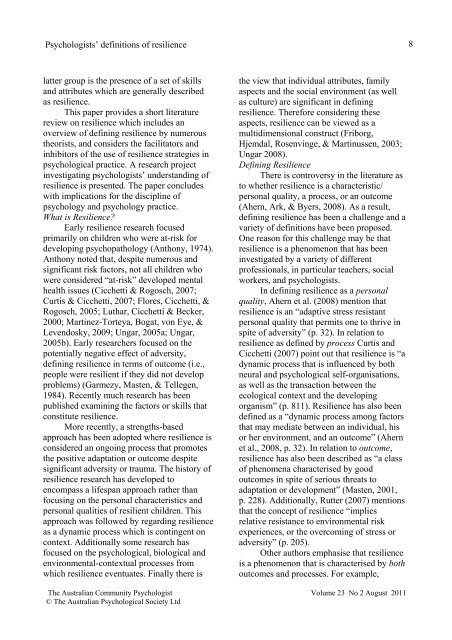The Australian Community Psychologist - APS Member Groups
The Australian Community Psychologist - APS Member Groups
The Australian Community Psychologist - APS Member Groups
You also want an ePaper? Increase the reach of your titles
YUMPU automatically turns print PDFs into web optimized ePapers that Google loves.
<strong>Psychologist</strong>s’ definitions of resilience<br />
8<br />
latter group is the presence of a set of skills<br />
and attributes which are generally described<br />
as resilience.<br />
This paper provides a short literature<br />
review on resilience which includes an<br />
overview of defining resilience by numerous<br />
theorists, and considers the facilitators and<br />
inhibitors of the use of resilience strategies in<br />
psychological practice. A research project<br />
investigating psychologists’ understanding of<br />
resilience is presented. <strong>The</strong> paper concludes<br />
with implications for the discipline of<br />
psychology and psychology practice.<br />
What is Resilience?<br />
Early resilience research focused<br />
primarily on children who were at-risk for<br />
developing psychopathology (Anthony, 1974).<br />
Anthony noted that, despite numerous and<br />
significant risk factors, not all children who<br />
were considered “at-risk” developed mental<br />
health issues (Cicchetti & Rogosch, 2007;<br />
Curtis & Cicchetti, 2007; Flores, Cicchetti, &<br />
Rogosch, 2005; Luthar, Cicchetti & Becker,<br />
2000; Martinez-Torteya, Bogat, von Eye, &<br />
Levendosky, 2009; Ungar, 2005a; Ungar,<br />
2005b). Early researchers focused on the<br />
potentially negative effect of adversity,<br />
defining resilience in terms of outcome (i.e.,<br />
people were resilient if they did not develop<br />
problems) (Garmezy, Masten, & Tellegen,<br />
1984). Recently much research has been<br />
published examining the factors or skills that<br />
constitute resilience.<br />
More recently, a strengths-based<br />
approach has been adopted where resilience is<br />
considered an ongoing process that promotes<br />
the positive adaptation or outcome despite<br />
significant adversity or trauma. <strong>The</strong> history of<br />
resilience research has developed to<br />
encompass a lifespan approach rather than<br />
focusing on the personal characteristics and<br />
personal qualities of resilient children. This<br />
approach was followed by regarding resilience<br />
as a dynamic process which is contingent on<br />
context. Additionally some research has<br />
focused on the psychological, biological and<br />
environmental-contextual processes from<br />
which resilience eventuates. Finally there is<br />
the view that individual attributes, family<br />
aspects and the social environment (as well<br />
as culture) are significant in defining<br />
resilience. <strong>The</strong>refore considering these<br />
aspects, resilience can be viewed as a<br />
multidimensional construct (Friborg,<br />
Hjemdal, Rosenvinge, & Martinussen, 2003;<br />
Ungar 2008).<br />
Defining Resilience<br />
<strong>The</strong>re is controversy in the literature as<br />
to whether resilience is a characteristic/<br />
personal quality, a process, or an outcome<br />
(Ahern, Ark, & Byers, 2008). As a result,<br />
defining resilience has been a challenge and a<br />
variety of definitions have been proposed.<br />
One reason for this challenge may be that<br />
resilience is a phenomenon that has been<br />
investigated by a variety of different<br />
professionals, in particular teachers, social<br />
workers, and psychologists.<br />
In defining resilience as a personal<br />
quality, Ahern et al. (2008) mention that<br />
resilience is an “adaptive stress resistant<br />
personal quality that permits one to thrive in<br />
spite of adversity” (p. 32). In relation to<br />
resilience as defined by process Curtis and<br />
Cicchetti (2007) point out that resilience is “a<br />
dynamic process that is influenced by both<br />
neural and psychological self-organisations,<br />
as well as the transaction between the<br />
ecological context and the developing<br />
organism” (p. 811). Resilience has also been<br />
defined as a “dynamic process among factors<br />
that may mediate between an individual, his<br />
or her environment, and an outcome” (Ahern<br />
et al., 2008, p. 32). In relation to outcome,<br />
resilience has also been described as “a class<br />
of phenomena characterised by good<br />
outcomes in spite of serious threats to<br />
adaptation or development” (Masten, 2001,<br />
p. 228). Additionally, Rutter (2007) mentions<br />
that the concept of resilience “implies<br />
relative resistance to environmental risk<br />
experiences, or the overcoming of stress or<br />
adversity” (p. 205).<br />
Other authors emphasise that resilience<br />
is a phenomenon that is characterised by both<br />
outcomes and processes. For example,<br />
<strong>The</strong> <strong>Australian</strong> <strong>Community</strong> <strong>Psychologist</strong> Volume 23 No 2 August 2011<br />
© <strong>The</strong> <strong>Australian</strong> Psychological Society Ltd

















